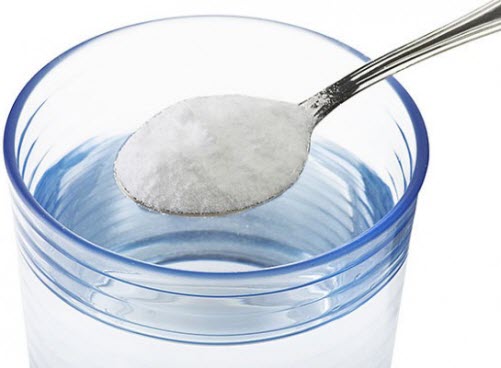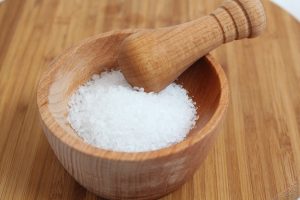
There are many natural remedies for oral thrush, and rinsing your mouth with a saltwater solution may be one of them.
 The basic principle here is that salt affects the bacteria and PH balance in your mouth, making it inhospitable to candida albicans, the main organism causing oral thrush. As a result, the colonies die off, which means that the nasty white patches disappear.
The basic principle here is that salt affects the bacteria and PH balance in your mouth, making it inhospitable to candida albicans, the main organism causing oral thrush. As a result, the colonies die off, which means that the nasty white patches disappear.
Before discussing the basic principles of salt rinsing, let’s go through the main symptoms and causes of oral thrush – identifying it correctly is the first step in treating it!
What are the symptoms?
Nasty-looking white patches are commonly associated with thrush, though they may be present in other diseases, too.
These patches won’t normally hurt, and they can be taken away with a spatula or scraped away with your fingers. If you do that, you’ll notice that the tissue beneath is swollen and may bleed, so it’s better to just leave them alone. They’ll go away with treatment, anyway.
Another common symptom is soreness of the mouth and difficulty swallowing, especially if the infection has spread to your throat. If it goes beyond that, you’re likely to experience fever and sickness, especially if your immune system is weakened.
What are the causes?
You should know that most people normally have candida in their mouths anyway. It only becomes infectious when it grows out of proportion – a process called candida overgrowth.
In healthy adults, there are many causes for this harmful growth:
 Smoking: since cigarette smoke disturbs the natural balance of oral bacteria, it may lead to candida overgrowth;
Smoking: since cigarette smoke disturbs the natural balance of oral bacteria, it may lead to candida overgrowth;- Dentures: if you’re not taking proper care of your dentures, you may develop thrush. You should clean them daily and remove them at night;
- Antibacterial mouthwash: if used excessively, it will affect the healthy bacteria as well, thus encouraging candida to grow;
- Taking antibiotics: as we’ve already mentioned, prolonged use of antibiotics disrupts the natural bacterial flora. This may lead to oral thrush;
- Stress: long periods of stress may weaken your immune system, thus preventing the healthy bacteria to keep candida albicans in check.
While all these factors are associated with oral thrush, this condition is relatively infrequent in healthy adults. If you do get it, consult your doctor – left untreated, it may lead to further, more complicated infections.
Patients suffering from immune-affecting disorders, such as AIDS and cancer, are also more likely to develop oral thrush, as are people suffering from diabetes.
How do I use salt?
As we’ve mentioned earlier, using salt helps dealing with thrush, though, if used alone, it’s not as effective as other treatments, such as fluconazole, or coconut oil.
However, if used in combination with other treatments, it will speed up the healing process.
What you have to do is dissolve half a spoon of salt in one cup (250 ml) of water, and use the solution to rinse your mouth. Repeat 2-4 times a day, until the symptoms improve.
If you prefer, you can use warm water for the solution, as it may sooth any pain you might experience. Rinsing after meals is also a good idea – it will remove any sugary residue that candida feeds off.
Conclusion
Due to its chemical properties, salt reduces the number of candida colonies in your mouth, thus helping to heal the infection. However, it’s not a powerful treatment if used alone.
As always, consult your doctor from the earlier thrush symptoms, and let them know if you’re planning to use any home remedies.

